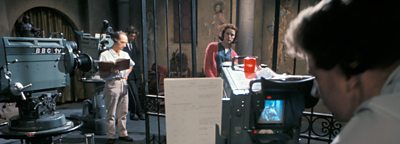In 1970 Colin Welland, a familiar screen face from Z-Cars and Kes, was having his house painted. One of the workmen was a young Glaswegian who captivated the actor with tales of being a drum major in the city’s Orange walks. Welland was also an acclaimed television playwright and he suggested to the young man, who had left school at the age of 14 to work in the Clyde shipyards, that he try his hand at writing a script. The result was received with enthusiasm by the producers of the Play for Today strand of contemporary single dramas. But with its unflinching presentation of violent clashes between Protestants and Catholics it was regarded as too controversial to bring to the screen. Only after a second script had been commissioned and produced as Just Your Luck (1972), was director John Mackenzie able to make Peter McDougall’s Just Another Saturday (1975). The film was showered with critical plaudits and won the prestigious Prix Italia.
Later, McDougall acknowledged, "I didnae know how to write, so I spelt everything the way it sounded. I didnae have an outline to write to, naebody showed me a script." Nonetheless, across the next decade and more McDougall wrote a sequence of exceptional dramas set in Scotland that challenged contemporary ideas about masculinity, violence and social deprivation. As it had done on many previous occasions, and as it would continue to do with unrivalled success, the ����ý Television Drama department had encouraged and nurtured a future talent of great distinction. Sympathetic commissioning of an unknown writer, together with a supportive production context, helped invent the future of drama.
New writers and their original scripts, however, had not always been welcomed by television. In the medium’s earliest years, before and after the Second World War, small-screen plays were drawn almost exclusively from those written for the theatre. It was a similar story at the start of radio drama, although the first original script for the medium was produced as early as 1924. Set in a coal mine, Danger was commissioned from the 24-year-old Richard Hughes, whose professional career to that point comprised just a single short play that had been staged at the Royal Court. Only a handful of pre-war television plays were created especially for the medium, but these included the intriguing Rehearsal for a Drama by Roy Carter and Emanuel Wax. Transmitted live from one of Alexandra Palace studios in January 1939, this was a murder mystery set in a television studio. Frustratingly, as with all television plays shown before 1953, we have no copy since the technology able to record a live broadcast was only brought into service after the war.
Through the 1940s and 50s, ����ý Radio, and especially producer Donald McWhinnie, continued to commission original scripts, including from Robert Bolt, whose first produced drama was The Last of the Wine (1955) for the Third Programme. A decade later, Bolt won consecutive Oscars for Doctor Zhivago (1965) and A Man for All Seasons (1966), an adaptation of his own smash-hit stage play.
Head of television drama Michael Barry also began, somewhat tentatively, to commission plays for the screen, both from established theatre playwrights like Terence Rattigan, whose The Final Test was broadcast in 1951, and from writers at the start of their careers. After winning a New Statesman competition and contributing short features to Woman’s Hour, Elaine Morgan started writing television drama even before she owned a television. Her debut Mirror, Mirror (1955) was a comedy about female beauty and identity, and she subsequently became one of television drama’s most accomplished writers, perhaps best-remembered for adaptations of Richard Llewellyn’s How Green was My Valley (1975) and Vera Brittain’s autobiographical story of the First World War, Testament of Youth (1979). Far less well-known is a regional opt-out half-hour made for ����ý Wales, Zombie (1968), set in a television studio and concerned with one woman’s resistance to the patronising chauvinism of the men around her.
Producer Alfred Bradley joined ����ý Radio in Leeds in 1959 and over the next two decades established ����ý North as an innovative powerhouse for distinctive regional drama. Among the new and emerging writers encouraged by Bradley were Alan Plater, Stan Barstow, Henry Livings, Don Haworth and David Edgar. In 1965 Bradley produced Billy’s Last Stand, a first play by a young writer whose work so impressed him that he recommended ����ý North offer a bursary to the author. The money gave Barry Hines the solitude and time to write the novel A Kestrel for a Knave, which was then filmed by Ken Loach as Kes, with Colin Welland in a central role. Bradley has been celebrated by many of his collaborators, including playwright Alan Ayckbourn, who worked with him as a drama producer in the 1960s and who he later hailed as ‘single-handedly producing a great wave of Northern writing’. But as Bradley, who died in 1991, recalled in an interview for the project A History of North Regional Broadcasting, his arrival in Leeds was far from promising.
By the time Bradley joined ����ý North, the Canadian producer Sydney Newman was making waves commissioning original television scripts for the ITV network’s strand of single plays, Armchair Theatre. Responding in part to the energy of the British theatre after John Osborne’s landmark Look Back in Anger, produced at the Royal Court in 1956, Newman sought outnew plays from young writers including Alun Owen, Clive Exton and, making his television debut with A Night Out (1960) by Harold Pinter.
In December 1962 Newman was tempted across to the ����ý, where the following year he created Doctor Who, and a year after that oversaw the start The Wednesday Play series, which was to run until 1970. Under producer James MacTaggart, this strand too offered opportunities for many new writers, including Dennis Potter, David Mercer and Jim Allen, as well as new directors and producers. Ken Loach and Tony Garnett were among the most iconoclastic creators, and with their predominantly location-shot dramas like Up the Junction (1965), scripted by Nell Dunn, and Cathy Come Home (1966), written by Jeremy Sandford, effectively invented another future for television drama.
In an oral history interview filmed in 1984 Sydney Newman recalled another of his initiatives, Thirty-Minute Theatre, started specifically to encourage new writers.
Thirty-Minute Theatre, which ran from 1965 to 1973, and its successor as a strand of half-hour, Second City Firsts (1973-78), were richly fruitful contexts for bringing the work of new writers to the screen. One of the many who benefitted from the opportunities of this format was the Guyana-born playwright Michael Abbensetts, who in the same month in 1973 had both a first play staged at the Royal Court, Sweet Talk, and The Museum Attendant produced on ����ý Two. The latter was based on his recent experiences of casual racism as a guard in a public gallery, and it led to further television commissions, including the ground-breaking drama series Empire Road (1978-79), the first British television series to be written, acted and directed predominantly by Black artists. Among his other television work was Black Christmas, a richly textured single drama of domestic life, directed by Stephen Frears, who had also directed the writer’s Royal Court debut.
In 1970, thanks to a scheduling change to Thursday evenings, The Wednesday Play became Play for Today (1970-84). The commitment to working with new writers, like Peter McDougall, remained as strong as before. And as dramas were increasingly shot on film away from the television studio, the strand also became known for identifying and encouraging new filmmakers. Among those who took advantage of the opportunities to make their first substantial films were Les Blair, David Hare and Horace Ové, each of whom became a significant creative force in the British film industry.
The extraordinarily assured period drama Licking Hitler (1978), written and directed by David Hare, was his debut as a filmmaker, although he had previously written plays for both the stage and small screen. As with so many others, he was offered this chance by the ����ý Regions drama unit in ����ý Birmingham under David Rose. Before working in television drama, Horace Ové had made the low-budget Pressure (1976), the first full-length drama feature film by a Black director in Britain, but he went on to write and direct both A Hole in Babylon (co-written with Jim Hawkins, 1979) and The Garland (1981) for Play for Today, as well as four episodes of Empire Road. Perhaps the most celebrated filmmaker to emerge from Play for Today was Mike Leigh, who had made only the low-budget feature Bleak Moments (1971) before producer Tony Garnett offered him the chance to devise and direct Hard Labour as a Play for Today. Leigh has since become one of the most celebrated contemporary British filmmakers.
Once Channel 4 began in 1982 to back full-length British films, which could also secure cinema releases, and when the ����ý followed this path with the Screen Two series, there were fewer opportunities for neophyte writers and directors to secure commissions in mainstream television drama. The stakes – and the budgets - for each film were higher than in the days of regular weekly single plays as Armchair Theatre and Play for Today had turned out. Producers and financiers increasingly needed the security of proven talents.
Even so, future star writers saw other opportunities open up for exploring the full creative potential of radio and television. Increasingly such chances came from long running soaps on both radio and television. Sally Wainwright who, following Last Tango in Halifax (2012-present) and Happy Valley (2014-present) is today among the most celebrated writers and producers for television, started in the 1990s contributing scripts to the ����ý Radio 4 serial The Archers. And Jimmy McGovern, creator of Cracker (1993-2006) and the writer of perhaps 2021’s most powerful and disturbing drama series, Time, with Sean Bean and Stephen Graham, started his career on the Channel 4 soap Brookside (1982-2003).
Nor is the only way now for aspiring writers to make a start to catch the attention of a sympathetic producer – although this can often help. ����ý Writersroom, for example, organises a clutch of schemes to, as they say, ‘discover, develop and champion new and experienced writing talent across the whole of the UK.’ Among their activities is running, in conjunction with Radio Drama North, the Alfred Bradley Bursary Award, which every two years in memory of the pioneering producer offers a writer new to radio a £5,000 bursary and the chance of a Radio 4 commission. Winners have included Lee Hall, now known for Billy Elliott and War Horse, and Peter Straughan, who scripted among other films the most recent adaptation of Tinker, Tailor, Soldier, Spy. Single plays for television by new writers may be a good deal rarer than they were back in 1970, but numerous strands of the future of drama for radio, television and the cinema continue to be nurtured by the ����ý. Across all the corporation’s services, we can continue to expect writers both new and established to engage with and challenge the Britain of today - and of tomorrow.
Written by John Wyver, University of Westminster.
Further reading
����ý, Watching Ourselves: 60 Years of TV in Scotland: Peter McDougall
, blog, Royal Holloway, University of London.
Sydney Newman with Graeme Burk, Head of Drama: The Memoir of Sydney Newman, Toronto: ECW Press, 2017.
Irene Shubik, Play for Today: The Evolution of Television Drama, Manchester: Manchester University Press, 1975.

